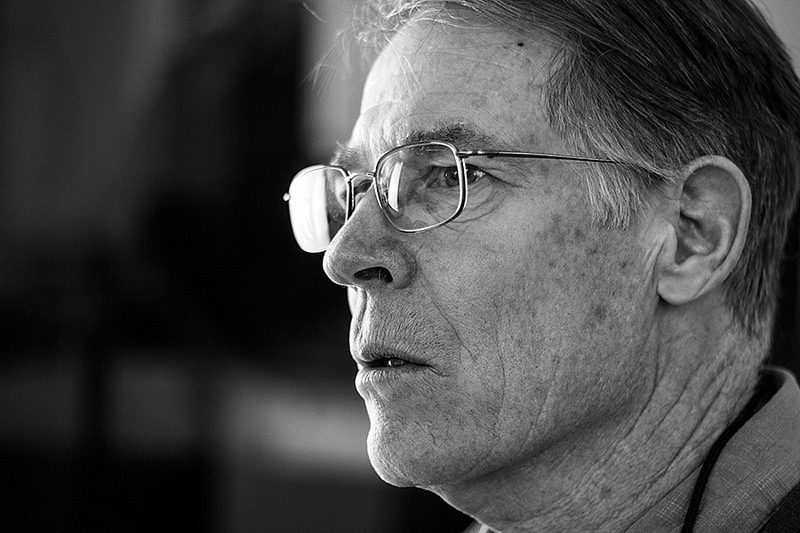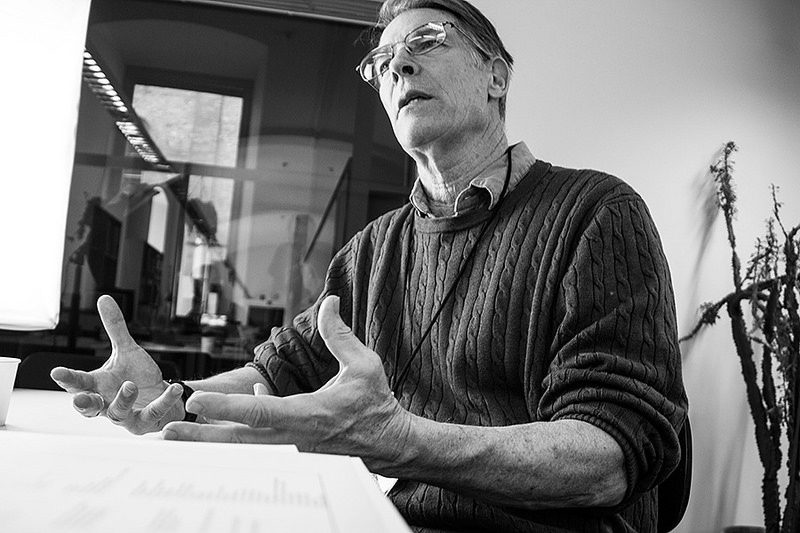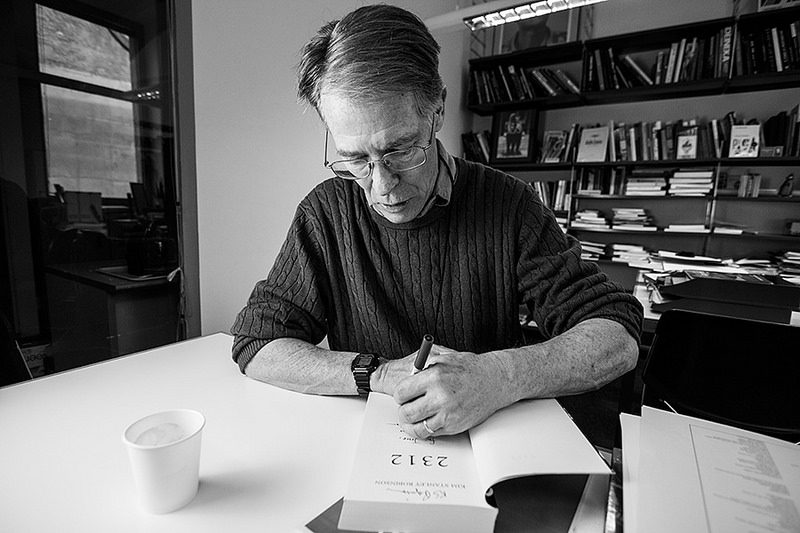
We meet with Kim Stanley Robinson (Waukegan, 1952) in Barcelona, during the annual literary convention Kosmopolis. Robinson is a respected and popular hard science fiction writer, especially known for his trilogy dealing with martian colonization and terraformation (Red Mars, Green Mars, Blue Mars). After Mars, he imagined humanity expanding through the whole Solar System (2312) or trying with enormous difficulties to reach for interstellar space (Aurora). In some of his novels climate change issues take a central role, particularly in the Science in the Capital trilogy and the recently published New York 2140. And sometimes he looks into the past instead of the future, describing life during an Ice Age (Shaman) or imagining how world history would have changed if all Europeans died during the Black Plague (The years of rice and salt). Most of Robinson’s stories, although peppered with revolutions, murders and catastrophes, are utopian and optimistic in their core. He speaks with restraint, correction and seriousness, but sudden flares of contagious enthusiasm light up his speech when discussing the transformative power of science or the urgent necessity of changing the current socio economic regime.
You are known as an utopian novelist. Frequently utopia is seen as something unattainable, a theoretical ideal of perfection, but in your novels it seems something more practical…
I’ve been following the definition of utopia sketched out by H.G. Wells: a dynamic kind of history without an end point; it’s not a perfect state, it’s a continuous process where every advance has to be defended against falling apart or going backwards. Joanna Russ, a great american science fiction writer, used to talk about optopia: given the conditions that you’ve been handed, you get to the optimum best situation politically. This is better for storytelling: you don’t have the “walk to the zoo” feel of standard utopia: even Thomas More’s Utopia has a little bit of story, but it’s really the description of an achieved society. Since Ursula K. Le Guin’s The Dispossessed and even before, the story of dynamic utopias has been told one way or another.
The character Arkady Bogdanov of The Martian Trilogy is a descendant of Alexander Bogdanov, the author of the utopian novel Red Star. How did Red Star help to shape your Red Mars, and what do you find appealing about Alexander Bogdanov?
I love Bogdanov. When Percival Lowell made his reports on what he had seen of Mars through his telescope and talked about the possibility of canals and martians, there was an international response. For Wells it was War of the Worlds and the idea of an aggressive ancient civilization, for Kurd Lasswitz in Auf Zwei Planeten Mars is an advanced technological utopia; for Bogdanov Mars was a space used to discuss the future of a communist utopia where the martians were red in the sense of being political leftists, ahead of us, advanced. Red Star is a really good utopian novel, and it anticipates many of the problems the Soviet Union had, a socialist country surrounded by capitalist countries. Bogdanov was a really interesting thinker in systems theory, and his writing is being remembered in different contexts because of his Tektology and his web of life studies. I wanted to make sure that my Mars trilogy picked up all the strands of all the previous Mars novels.
One of the highlights of The Martian Trilogy is the writing of the Mars Constitution. Many measures are proposed in those chapters, and I would like to take a closer look at some of them and ask if you see them to be feasible on our Earth. For instance: common stewardship of natural resources: air, land, water… How could such a “management of the commons” be implemented on Earth?
That’s a good question. We do have certain commons, the oceans and Antarctica, but these are somewhat empty and uninhabitable spaces. That phrase of the Martian Constitution is an attack on the law of property. It’s anticapitalist, fundamental marxism: land itself belongs to everybody as a commons. This is similar to the native american view that you can’t own land, a concept shocking in our capitalist system. There’s a little bit of talk of the return of the commons in regards to who owns the Internet. That is kind of virtual land: I see legal discussions about all the new regimes and possibilities created by technologies. And as for real land itself: about 30% of the surface of the US is owned by the federal government, and some smaller parts owned by state governments, so this is owned by the people as commons. The commons was never just free space, it was always regulated, an organized system, even if it was informally. The air is for everybody. Could water be privatized when people need it to stay alive? Land is part of that. Property needs to be shifted over effectively to tenure rights: you have the rights to take care of the land for the people in certain ways, and that procures you a certain amount of rights that don’t extend to the fullness of property rights. This is kind of shocking in the current legal regime. It’s definitely speaking in an utopian way, but you see strands with the Internet. It may become relevant pretty soon in discussing the Moon: the Outer Space Treaty is based on the Antarctic Treaty, so right now nobody can claim property of the land on the Moon.

Another article in the Martian Constitution takes out from free market and into non-profit co-ops the bare necessities of life like housing, health or education. This sounds difficult in a capitalist society: in Spain we have an ongoing housing crisis, in the US health care is notoriously irregular… How could we make this happen?
Thomas Piketty in Capital in the Twenty-First Century talks about how progressive taxation should not be just on the annual income, because that can be buried under the system and hidden, but on capitalized assets themselves. That would legislate caps on how wealthy can you be: beyond a certain amount of wealth, the excess goes back to the public good. That is a transformative thing, a horizontalization of wealth and power. With progressive taxation like that, governments would not be impoverished, they would seize the surplus value and afford universal healthcare, free public education through college, and guarantee the necessities like shelter, clothing, human basic needs that everybody gets. And also full employment: if government can afford to make sure that everybody who wants a job has one, you don’t get massive unemployment like in the bottom of Europe. These things need to be paid for, but governments can easily be made much wealthier by a seizure of surplus value by way of progressive taxation. After World War II there was quite extreme progressive taxation, even in the US under Eisenhower, a Republican president. After you made four hundred thousand dollars a year, that in our days will be like four million dollars a year, the tax rate was 91%. So essentially they capped the wealth, and you could not be a multibillionaire like we’ve got today, because everything you made after a certain amount went to support government programs. And you can advocate these kind of things without being a complete communist or a completely utopian person like a martian. You can talk about policies that used to be enacted and could be enacted again, there’s legal and precedent base.
But we allowed a counterrevolution to take over the world, and it sucks. We are suffering the results of the Reagan-Thatcher neoliberal turn of the eighties, late global capitalism, the seizure by the rich of the surplus value and the impoverishment of everybody else becoming the precariat, in that their lives are precarious. Employment and health is precarious, pensions gone away… All by impoverishing government and repeating the three infamous lines “The government is not the solution, it is the problem”, “There is no thing as society” and “There is no alternative”. We need the keynesian pendulum between government and business to swing back, because people is suffering. It’s the weakest leftist argument possible, just keynesianism, but it’s all we got at this point. You don’t want to get into an either/or apocalyptic revolutionary situation in which unless we change everything we’re completely screwed. But if it’s just a simple political battle: more left and less right, anti-austerity, keynesianism, social democracy… This is a sequence that can be fought for. It could happen in the EU: the PIIGS countries, Portugal, Italy, Ireland and Spain, banded together into an anti-austerity league. But the world has gotten so neoliberal… The cultural space has been stupid. This is what I’ve been doing as a leftist, telling the same story over and over again.
In the post-capitalism you describe in 2123 and Blue Mars, another key element is the substitution of big companies by medium-sized co-operatives in the model of the basque Mondragon.
I have been recently contacted by a professor at Mondragon university who sent me his history of how Mondragon came about. It’s very interesting, how a single catholic priest organized people to talk and talk and talk, fifteen years of political education in itself within a pre-existing industrial base. So now I know more and I’m still very interested, because it’s an already existing alternative to capitalism within the working capitalist order. An interim step that can be enacted right now: everybody could organize around employee-owned Mondragon-type cooperatives and start working with a better value system, ownership without the usual exploitation of labour and appropriation of nature that you see in the rest of the system. Within the already existing capitalist order you have alternative orders that are legal, they don’t need to be revolutionary, you don’t need to get into the chaos of Barcelona 1936 where anarchists and communists were fighting against each other over how to make a completely new society… Instead you have something like Mondragon where in the already existing society there is a change coming from inside.
Why do you think that the Mondragon model has not been reproduced more widely?
Probably because it flattens the power gradient and it doesn’t make enough of a profit for the ownership class, so it’s unpopular with the people that actually control the already existing mobile capital, captured as it is, sequestered in banks and defended by guns. They don’t want it to succeed because it’s a horizontalization of power. In the current vertical system, people who manipulate most of the money will not give up that power voluntarily, so they need to be politically whipped and the the laws need to appropriate it for the people. We need to tell a story that’s plausible enough and persuasive enough that people will act on it in terms of political behaviours and votes going towards political parties that support this model. It surprises me that it is not more popular and effective and quick than it is now. I guess this is what Gramsci was talking about with hegemony, the mental quality people have of accepting their own subjugation because it’s natural, because people agree with the “there is no alternative” mantra. It’s sad, it strikes me that people should be a little bit sparkier.
The Trump Administration presented a budget including huge cuts in most of government agencies, and a 31% cut on the EPA (Enviromental Protection Agency). How do you think that these cuts will affect the US if they come to pass?
It’s a particularly ugly attack on everything valuable and right. These people are thugs and clowns and they are saying “fuck you” to American values. In the polls people like having clean air, clean water, they like the EPA! In effect we’ve had a weird little seizure of our government by a crew of people who are being deliberately destructive. The budget proposed will not be enacted the way it is described, but it feels like somebody taking a crowbar and smashing things, so until you subdue these people, until you tie them down and get them out of the room, it’s hard to do anything but defend what’s already existing. You can’t make improvements, you can only defend what you’ve got. But they are suffering massive defeats. They can’t even agree whether to destroy things in one way or another, so they’re wrecking their own possibilities. I’m hoping that in four years, or two years, or even something shorter than that, something will occur to slow them down. They’re not really governing, just gesturing. It has been irritating and ugly and painful…

With NASA funding going down, some think that private exploration of space will become more important, with companies like SpaceX or Moon Express leading the way. What dangers do you see in the privatization of space exploration?
I don’t like the privatization of space at all, I like to think of it as commons and public. On the other hand, the governments of the world have always paid private companies to build rockets. SpaceX doesn’t have the money to fund a space program of its own, so it has to sell its rockets to somebody. I have the feeling that some billionaires could indeed build some small base as kind of a legacy project on the Moon… But you can’t make a profit in space, there is nothing up there that we want badly enough. You can send communication satellites, so there’s industry on Earth orbit, but there’s no possible industry on the Moon. Right now the Outer Space Treaty would control questions of ownership and exploitation, and there’s nothing to exploit. The Moon it’s simply rock: silica, iron, aluminum, magnesium: we already have lots of that on Earth. The danger of privatization isn’t very extreme. It’s something like Antarctica, it’s vulnerable to exploitation, but there’s nothing there to exploit…
This privatization trend may extend not only to space exploration… Right now Google’s Calico and similar companies are investigating senescence, leaving potential longevity treatments in the hands of for-profit corporations. Will life end up being extended just for the wealthy?
Again, it’s not very much of a danger, but because we’re not really very good at it. All medical advancing is good, and I think it will always remain organized by organizations like National Institute of Health. But it is a danger that if pharmacology companies develop what you may call longevity treatments, they might end up very expensive at first, only affordable by people having lots of money. That’s a frightening possibility, but it’s good to have health advances, because eventually everybody will benefit. It might create the conditions of a big fight, when finally income inequality will be challenged fundamentally by people saying that everybody has equal right to longevity and health. There’s a revolutionary possibility there, but for now there’s nothing to be done but continue to keep ahead in the game. It’s a very slow progress: average lifetimes are not very much longer that they were, it’s an asymptotic curve.
There’s a proverb often appearing in your books, from an elder in Shaman to some characters in Science in the Capital or even a story title in The Martians: “enough is as good as a feast”. Why does this sentence resonate so much in you?
It’s a quote to get out of capitalism. Economics, which is the quantitative study of capitalism, it’s always saying “more is better”. And since we’re in an ecological crisis of over consumption and wrecking the planet in order to get “more is better”, it’s important to keep insisting on its contrary, “enough is as good as a feast”.
There seems to be distrust in the scientific world and the hard science fiction community against politics: for instance in Neal Stephenson’s Seveneves the political characters are mostly evil, and the Space Ark Constitution is seen like a burden… Why do you think this distrust or lack of interest for politics exists?
They’re making a dichotomy between the sacred and the profane, between purity and corruption. Stephenson’s not good on these issues, he’s a bit reactionary and cliched. It plays into bad fantasy to suggest that politics is just grubby and parasitic, and science is some kind of pure, holy thing. In fact, science is intensely political and needs a big part of the money allocations of governments, and it needs government and regulation, because it can’t be done by individuals or individual corporations. Science is a gigantic team effort, and requires, therefore, government. At its best, I guess that what Stephenson’s saying is that politicians are scientifically uneducated just as scientists are politically uneducated. But that’s being generous, because he mostly plays the mannequin cliches of good scientists and bad politicians. He is very popular, so it would be great if he was a little bit better on this issues, even using them as political education… But unfortunately, I think one of the reasons for his popularity is that he plays into already existing prejudices.
In Green Mars one character thinks that the synthesis of a scientist and a mystic would be called an alchemist. Which kind of common ground can a mystic and a scientist reach?
This is my character Michel, who is always trying to recover or invent a psychology of the scientist that allows them to be a little mystical and have a value system that is not some kind of poorly theorized empiricism. A lot of scientists are fairly naive and underdeveloped about what is their project. They don’t have much in the way of theory. Science needs to think of itself more as a humanism and more as an utopian politics that’s already enacting itself in the real world. This is what my books are trying to suggest. I’m doing what I can by telling stories about what science is, how science works and what scientists should do in terms of being political actors. Time after time, story after story, trying to take a different angle on the problem. It’s a little bit like a kid playing with his dolls, it’s presumptuous to think that I’m doing anything, but people read stories, and some scientists read science fiction to try to think about what they’re doing, so… I do what I can.

Buddhism appears in your work, specially in Science in the Capital and The years of rice and salt. What do you find appealing in buddhism and how did you become interested in it?
I’m from California, and California pays close attention to East Asia, more so than the Eastern part of the US, which looks back to Europe. All through the XXth Century, Chinese and Japanese immigrants were coming to America and heading California first. The poet Gary Snyder, who was my teacher, went to Japan and spent ten years studying and practicing Zen buddhism. He came back along with a lot of other Californian of European origin, and began to to make what you could call a California buddhism, heavily influenced by Zen and the Dalai Lama, but also by New Age or hippy California ideas. It’s very diffuse, secular and unserious, compared to the more strict Buddhist traditions. So in Californian culture buddhism is an important strand, like in China: the chinese talk about the triple strand, a braid of beliefs composed almost equally of buddhism, confucianism and taoism. For the Californian intellectuals buddhism is about as important as Christianity or any other European influence. As for me, I wouldn’t claim much. It’s completely casual, a literary interest as much as it is a spiritual practice. It helps in daily life: the suggestions of Zen on how to pay attention to the present, how to be in the moment, how to live life, what’s important as a value system… It’s been helpful to me as a person. It stroke me as interesting in Science in the Capital to think of science as a kind of buddhist practice. A devotion to the real is suggested by both Zen buddhism and science; maybe science is like a quantified buddhism. In The Years of Rice and Salt I described a world in which all Europeans were gone after the Black Plague, so buddhism might become much more important as an intellectual tradition. Those are two different ways of using buddhism, and in my other books it’s not so important. Buddhism wants to be useful in this world, so I think it’s more a way of life or a practice than a religion per se. Lots of buddhists don’t speak about an afterlife. Some do, because they talk about reincarnation and an eternal soul. If you’re a materialist, which I am, and you don’t believe in an eternal souls, then that part of Buddhism is kind of useless. So it’s a mixed picture.
Sufism is heavily represented in Red Mars, along with some Rumi poems. How does Sufism appeal to you?
In Mars I wanted Islamic culture to appear, and in The Years of Rice and Salt I needed to discuss in great detail Islamic culture as one of the world culture that would be prominent if all the europeans died. So in both cases it’s sort of similar to buddhism, that appears in some novels and not in others. I looked for the mystical humanist liberal tradition in Islam, as opposed to the conservative salafist wahhabist controlling totalitarian parts of Islam. All the great religions seem to have a liberal and a conservative wing, and in Islam I got interested in the Sufi tradition because it did look like a kind of mystical hippies of the XII Century… And Rumi is a beautiful poet.
There are references to mystic epiphanies in your work, like nature contemplation in the peak of a mountain. Have you experienced these kind of satoris yourself?
I have, it’s hugely important to me to go to the mountains. I grew up as a kid in the beaches, so first it was the ocean. In this stupid middle american suburban 1950s white culture, it was almost obviously crazy not to go out into the ocean. Just a hundred meters offshore you are back in a primal reality of water that can kill you, but it’s also floating you and it’s quite benign if you know how to be there. The ocean was crucial to me for staying sane when I was a kid. And then I discovered the Sierra Nevada, the mountains of California! My suburban Californian reality as an ordinary middle-class american was augmented by this wilderness experience. Going out to the mountains, having athletic hard working experiences, but also spending a lot of time outdoors just walking, dealing with rock. It’s very low-key mountaineering, we’re not doing anything dangerous and we stay out of vertical faces, but it’s been a crucial part of my life. Close to a month a year I’m up in the mountains, doing walking expeditions.
I guess that many scenes in Shaman, a story set in an Ice Age, are drawn quite directly from your experience…
That was a beautiful thing, because we don’t really know how the Paleolithics lived like, and to write about that was an imagining exercise. But I knew about snow-camping, because I’ve done it myself and I could write about snowshoes and what was it like to work in the snow. Since Shaman is about an Ice Age I could write about it with that little extra degree of lived reality which is important for novels. It was a joy and I probably put too much of it, but I couldn’t stop myself.

What do you think that is similar and what is different between a Paleolithic person and a contemporary one?
Similar, for sure, is the genetic material: we have exactly the same genes as them. Similarly, we are in close contact with a group of people about the same size that we know socially well. We have what I call your pack or your tribe, thirty or fifty actual people that you interact with, face to face and day to day. Those are similarities. They also had a cosmology, a sense of what was going on in the world. In some ways the didn’t know as much as us, like what are the stars, and in other ways they did know a lot more than us, like which plants can you eat and not, and how can you manipulate the landscape. The main difference is that we are dealing with a sense of global society: we know that eight billion people exist, while Paleolithics were very limited in what they knew about other people, they had intensely localized knowledge. Knowing the global picture we have extra obligations.
In 1995 you stayed in Antarctica as part of the National Science Foundation’s Antarctic Artists and Writers Program. Given the frequent appearance of Antarctica in your books, it seems that the visit had a profound influence. What do you remember most about that time and how do you think it affected you?
I loved it! I just went back to McMurdo during eleven days in the last fall for the first time since 1995. Quite a few people are coming back and forth, arranging their entire career to keep going down there. It’s like the Sierras turned into a surrealistic superdream, it’s like going back into the Ice Age. The people are very kind and interested in each other. They tend to be scientists and people who support scientists, so there’s a huge sympathy for what science is about. It’s a small, simple society relative to the world at large, but I love it and I was very happy to go back. It resembles space: Antarctica is like a space station operating down there, and that’s useful if you’re writing about stations gathered across the Solar system. The visit was so beautiful… I didn’t like the idea of staying in McMurdo the eleven days, leaving for the wilderness only in brief trips in snowmobiles or helicopters. I thought it would be lesser, but it wasn’t lesser at all! It was fascinating and spectacular even just to be in McMurdo. When I went in 95, McMurdo was just a transfer station where you went to wash your clothes and get to the next wilderness. But now it’s interesting, and now I know it’s interesting. Maybe it’s also a little utopian space: the continent for science. There’s no money. The food and the clothing is all provided, and there is no property, the world owns McMurdo. It has all kind of suggested aspects of utopia. Orwell wrote about the day in Barcelona when anarchists took charge and everything felt different. I think McMurdo was like Barcelona in 1936, that moment when the political rules and the customary order of capital, property and class are gone, and you see just people, everybody equal and just doing their jobs. I just reread Homage to Catalonia by Orwell, because Ian Watson showed me the parts of the city he writes about.
There’s a narrative device that appears in different forms in some of your books: the Founding Father (or Mother) dying at the very beginning of the story. John Boone murdered in the prologue of Red Mars, Alex in 2312, it happens also in Aurora… How does this “having to fill the shoes of a great predecessor” trope appeal to you narratively speaking?
It is a huge challenge to properly take up the wisdom of the past and put it to use when you start up as an adolescent, or you have a society that needs continuity. Occasionally you have exceptional characters who manage to lead, hold things together and suggest new ways, but then always afterwards comes inexperienced ordinary people who might be less talented but need keep the advances alive. It’s an interesting story to tell: the feeling of being overwhelmed, of stepping into someone’s shoes and do a proper job with it. We’re always in that situation, right? Whatever advances we’ve made in the previous centuries or in the generation before you, it’s not automatically that you can hold to them. That’s in Shaman too, now that I think of it, because Paleolithics held on to knowledge by oral transmission alone. We know they did it because the cave paintings thirty thousand years old and seventeen thousand years old have the same same skillset, the same vision. It’s ten thousand years of continuous transmission of culture without written language! Perhaps even written language gets in the way. But they managed to do it, so something was going on there. It’s a story that keeps getting told succesfully.
In Aurora you talk about the ethical and ecological limitations of interstellar travel and colonization, and the general feeling of the book is that these problems may not be overcome; the view on space colonization seems grimmer than in The Martian Trilogy. Has your attitude towards space exploration changed between Blue Mars and Aurora?
No, it’s the difference between the Solar System and the interstellar space. Aurora was trying to set a limit beyond which colonization does not work. Despite the way that science fiction usually talks, interstellar space is just too big for humans to cross. This is an important new story, a new finding coming out from the better understanding of biology, ecology and human psychology. That’s a fantasy space, an idea cast in human culture that we were destined for the stars, that the Earth was just our cradle, and so it is unimportant in the same way that a cradle is unimportant to an adult. That’s completely wrong, and that needed to be shown in Aurora. In the Mars trilogy I still like the idea of the Solar System, and I think that Mars is a great place to inhabit and the rest of the Solar System can be turned into something like Antarctica: we have scientific stations out there, so you visit them and you come back home, because you can always stay healthy on Earth. But the interstellar dream needed to be smashed, and that’s what Aurora did. If you read the book I think my reasoning is sound. Science fiction has lied on this issue. How far away is Tau Ceti? It’s twelve light years. Twelve is a little number, but then you think it’s actually ten billion times further away than the Moon, ten billion times, you start to get a sense of the scale… And much of the stars are much farther away than Tau Ceti . If you’re being honest, you’d see that this universe that we can see at night it’s very interesting, but we cannot get to it. We have to stay here. And then you understand that there is no Planet B. Earth is our one and only home and that’s a permanent situation, so we have to keep it healthy. That’s a very important story for science fiction to tell, so I felt it was really necessary to do Aurora… Although a lot of people got really angry at it.

You have criticized Elon Musk’s approach to Mars colonization. Which are your main concerns about his plans?
I don’t like this notion of one person doing and controlling it, it’s like privatization, or trivialization to turn it into a tourist attraction. I also don’t think that Mars functions as a second home for humanity. Having a mass extinction event will be OK as long as there’s five thousand or a million people surviving on Mars? The stated purpose of a Mars colony is stupid and trivializing. And also they’re waving their hands when it comes to talk about landing in Mars. A lot of the technical plan hasn’t been tested and we don’t have protocols yet in place, so it’s very much of a science fiction plan pretending to be a real plan. We only have 50% success rates landing these little robots on Mars, but landing humans would take a lot more than that. It’s a little weird to say to the world that they’re going to Mars when both the methodology and stated purpose are weak… And so it begins to look like narcissism. That being said, Elon Musk is way more interesting than most billionaires in terms of what he wants to achieve. Tesla is a great car and we need electric cars, and the Falcon is a great rocket and we need great rockets. I’m afraid that my criticism of Musk might sound like a complete condemnation, while it’s closer to small differences. I don’t want to be too critical. He wouldn’t really come up if it he wasn’t doing really important work. It’s best for me to emphasize that SpaceX is a great company and the rest is kind of philosophic, like why and how would you go to Mars. Every martian has their own favored methods. He’s a martian, I’m a martian, we have some disagreements there… But I probably should emphasize the way that he’s doing interesting things.
In your later books quantum computers and artificial intelligences take a big role: 2312 has the qubes, and a quantum AI is the narrator of Aurora and a great character in its own right. Do you think that consciousness may be a quantum-related phenomena, and hence we may end up creating a sentient entity with quantum computing?
I don’t know for real about this, because I am an English major and I have to take the opinions of the experts who are involved with that… Making a quantum computer is still an open question, there are some crucial problems like stabilizing the qubit. But if you can make a quantum computer, both technically and system-wise, you would have an extraordinarily fast computer, way beyond what our computers are now. At that point you get processing power almost as fast as the human brain, but it won’t be organized like a human brain. And we will never know what sentience is or how the brain achieves it. You can’t investigate the brain without killing it, and once you kill it you don’t have sentience, so there is an invisible but permanent barrier in our understanding of how brains work. And this is something that the AI crowd try to ignore, and specially the science fiction crowd who want to download brains into computers… These are fantasies in which people ignore the permanent barriers in our understanding of brain and consciousness. It’s always going to be approximated and vague, so we will not be able to recreate it. But what I explored in 2312 and Aurora is that if we got a working quantum computer, maybe it wouldn’t matter that it didn’t operate like a human brain, and maybe it wouldn’t matter that it is not sentient as we are: it might still be extraordinarily fast and expressive of something like thought. It could easily pass the Turing test, as that test is not really very hard. So what you get is not just another human mind, but something that might talk like a human without you knowing what is really going on inside… Whatever it is, it will be extremely fast, but emitting a string of sentences like ours.
Actually the quantum sections in 2312 work like a prose poems almost, all these strands of thought trying to express how a quantum consciousness would be…
That was amongst the most fun I’ve ever had as a writer. I tried to think about stream of consciousness, the literary technique of the XXth Century that Joyce, Woolf, and a few other writers explored as a way of expressing how we go through our days. But I’ve always thought it was a little artificial, because a lot of us go through our days like Proust, with mental proustian sentences of incredibly articulated grammar, and not this broken jumble full of sensory impressions. But for my computer it worked. [Laughs] it was so much fun, because I’m normally a fairly conservative stylist.
2312 has some references to Marina Abramovic and Andy Goldsworthy. Are you interested in performance art and land art?
I definitely am. I just saw Abramovic in New York. Her friend Hans Ulrich Obrist, who is a curator, put us in contact with each other to do a collaboration together. It wasn’t successful: she wanted to put audience into a trance and I wanted to tell a story… We had a big argument. There was a third collaborator, an audio engineer who managed to make something out of our fight. But I do love her, she’s a great artist full of ideas, more ideas than she has time to unleash on the world. I think her duration performance art is a kind of self-therapy: when she’s doing her art she slows down and focuses, while in her daily life she is like an ADHD person, with bouncy rapid thinking. Goldsworthy is very reclusive. I’ve tried to send him books and say that I love his work and I’ve put it into my stories, but I never managed to contact him. Probably the books arrived to him, but he’s not interested in replying… I like to do Goldsworthy’s type work. Up in the Sierras we build Goldworthys, as we call them, and then photograph them and knock them down at the end of the day, to avoid bothering other people. Abramovic and Goldsworthy are both very important, for extending art to our daily lives and then change your sense of what life and art are.
What was your most recent pleasant surprise in science fiction and non-science fiction reading?
I just read the Neapolitan Novels by Elena Ferrante, a four volume novel about two women who grew up in Naples and are about the same age as me. In science fiction I’ve been reading The Dervish House by Ian McDonald, a fantastic novel about Istanbul in the near future.
What is your opinion on geoengineering, terraforming Earth, so to speak? There was a rogue geoengineering effort some years ago of ocean fertilisation in Canada…
I’m very interested in geoengineering, because I don’t think there’s anything intrinsically wrong with it. I don’t think that ocean seeding is technically a good idea for capturing carbon, but I think bigger groups and governments ought to be discussing these things, and possibly make some experiments to see what works. We might end up needing geoengineering… We might end up in a climate crisis, if we pass a tipping point where the methane under the permafrost starts to get released to the atmosphere, and we go into a jungle planet mode or a mass extinction event. Then geoengineering is a tool that we might want to use. I’m in favor of discussing it without any moral horror at the idea of interference, even though I don’t think we’ll be good at it. There are lots of processes in a geological scale that are really too big for us to influence in any useful way.
One of the themes I see in The Martian Trilogy is the reconciliation of apparently opposite ways of life, like the conservationist attitude of the Reds and the transformative power of the Greens. Do you think that it is possible to find an equilibrium between keeping the nature in its primeval state and adapting it to human needs?
Yes, more and more I become convinced that the bad thing is trying to be pure, purity is useless to us. Wilderness is a nice idea, but once you alter the atmosphere and the oceans there is no wilderness anymore, all the planet is a mongrel planet, and what you want to do then is to avoid extinctions. That takes working landscapes, like farms that also support some wildlife, or zoos, or landscape enclosures. I’ve read about these parts of Europe that are being almost abandoned, like central Spain, central Poland, the center of the US, Montana or North Dakota… Where is not easy or economical to do agriculture, people leave for the cities, and so big places of the countryside are empty now of humans. This is extremely interesting, because we need that. It’s not wilderness, but ex-human land where humans built towns or roads and abandoned them. We might have a world that includes some semi-wilderness, or empty land that is still human land or even lightly agricultural… Everything except for purity, I don’t really worry about purity anymore.













Pingback: Welkom bij de Chrononauten!
Pingback: Konsekwencje rewolucji i rewolucja konsekwencji, czyli "Zielony Mars" Kima Stanleya Robinsona – Qbuś pożera książki
Pingback: Blog Post #3: Kim Stanley Robinson: ‘For The Future’ – Charlotte Alexander Envi Com Blog